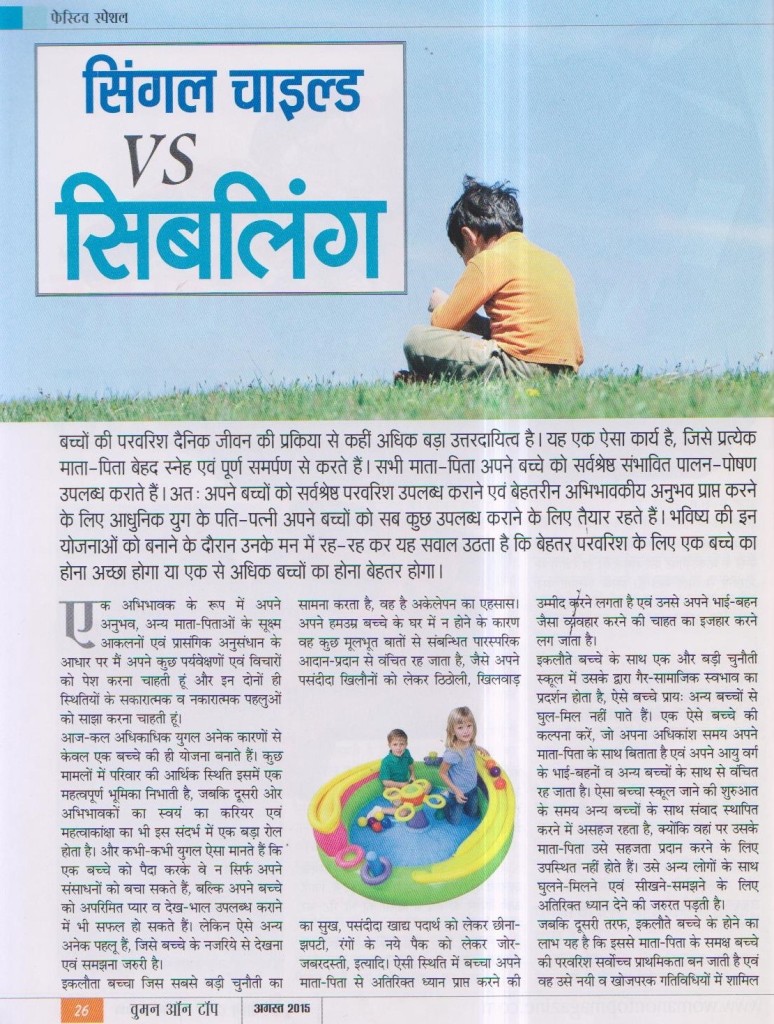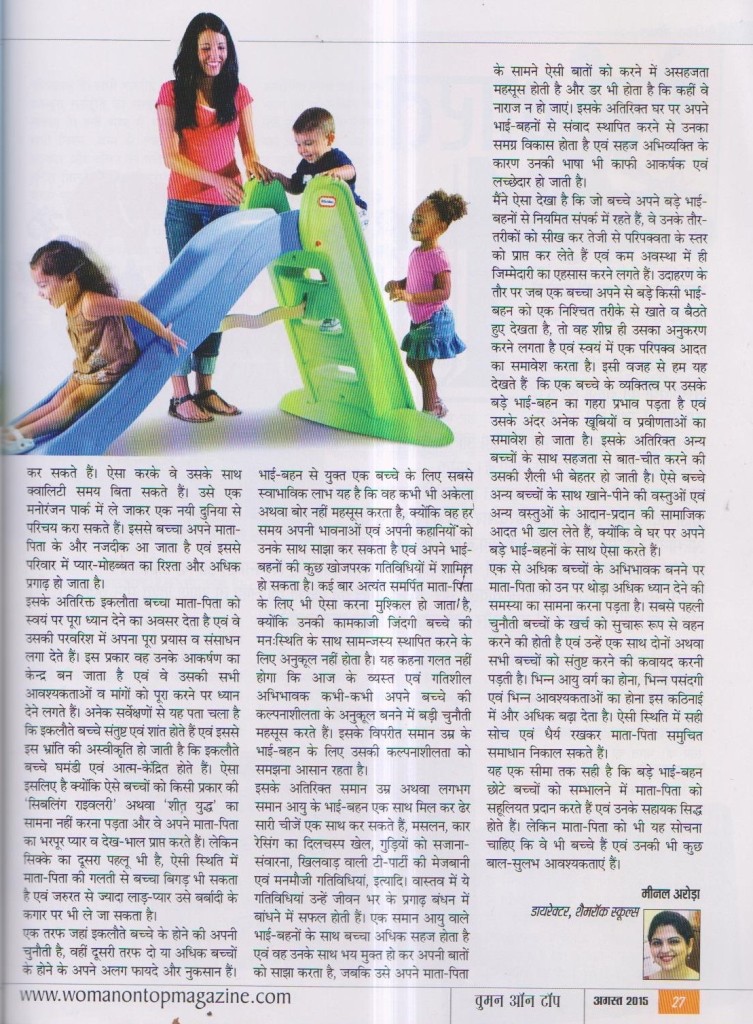
Raising children is much more than a routine life process. It is something that every parent does out of utter love & affection and utmost dedication. All parents want to provide the best possible upbringing to their child. Therefore, to be able to give the best to their child and to have a better parenting experience for themselves, many new age couples wish to plan for everything about their child in advance. Amidst such planning for the future & brainstorming for the betterment of their child, a question that often crosses their minds is that whether it is better to have a single child or more than one child.
Based on my own experience as a parent, my close observation of other parents and my acquaintance with relevant research findings, I would like to share some of my observations & thoughts concerning each of the two situations with all of you.
More and more couples these days are choosing to have only one child for a number of reasons. In some cases, it is the financial constraints of the family, while in others it is the parents’ desires of fulfilling their own career goals. And many times it is simply the couple’s belief that this is the best way through which they can save & provide all the resources, love & care to the child. However, there are a lot many aspects that need to be understood from the child’s perspective.
One of the most noticeable challenges that a single child faces is the feeling of loneliness. With no other child of her age at home to share her favourite toys with, to enjoy silly make believe games with or to fight with for a few extra bites of food or new pack of colours, the child seeks even more attention from the parents and expects them to behave as her sibling would. Since most people in big cities have nuclear families, there is usually no one to give that added attention to the child, unlike in a joint family. The situation becomes furthermore tricky when both the parents are working.
However, if the parents maintain a friendly relation with the child and spend ample time with her, they can surely fill in the space of her sibling with a little more efforts and affection. Another challenge with an only child can be her non-social nature at school or her inability to mingle with other children. Think of a child who has spent most of her time with her parents and not with any brother or sister of her age group. Such a child, in general, will find it a bit hard to interact with other children when she starts going to school, where her parents are not present to comfort her. She might also need some additional care and practise to learn to converse with other people.
On the other hand, as for the benefits of having a single child, parents of an only child, the child being their first and foremost priority, try new & innovative activities with her, thus spending quality time with her. When they find it difficult to get involved into the child’s world of imaginary creations and activities, they find a way to involve & engage the child into their own world of other exciting things like taking them to movies, going to game arcades or enjoying rides at amusement parks, etc., more often than usual. This brings the child much closer to her parents and helps the family’s bond grow even stronger.
Also, having a single child allows the parents to devote all their time, efforts & especially resources for the upbringing of their one child; thus, keeping her at the centre of attention and focusing on all her needs & demands. Many surveys have shown that quite opposite to the popular belief that an only child grows up to become more arrogant & self-centred with age, in reality, such a child turns out to be more content & calm. This is clearly because the child does not have to experience any ‘sibling rivalry’ or any ‘cold war’ to win her parents undivided love & attention. However, there is always a possibility of spoiling the child if the parents don’t know where to draw the line and keep fulfilling all her demands without her putting in any efforts.
While having a single child has its own challenges and benefits having two or more children has its own set of advantages and disadvantages, too.
The most obvious advantage for a child with siblings is that she never feels lonesome or bored as she can always share her feelings, tell her stories or try some inventive activities with her brother or sister, activities that sometimes even the most dedicated parents find difficult to do for their child because of their tough work-life or maybe their psychologically ‘adult’ brain. It wouldn’t be wrong to say that for today’s ‘up-and-running’ parents, it is sometimes challenging to be able to relate to the child’s imagination completely. Whereas, a brother or a sister belonging to the same age group, can understand her vivid and artistic fancies, easily.
Moreover, same aged or nearly same aged siblings enjoy doing most of the things together, example, playing with fun race cars or clothing the dolls, hosting the little make believe tea parties or doing the crazy little experiments & expeditions, etc. in their own special ways, which actually helps in strengthening their bond for lifetime. Even when there is an age gap between the siblings, the child feels more at ease in sharing her thoughts and mental state with her elder brother or sister, than doing the same in front of her parents because of the fear of disapproval or misunderstanding. Additionally, interacting with her siblings at home, in a way, helps a child in developing her overall skills of language and in improving her ability to express herself freely.
According to what I observed in children with elder siblings, because of watching her elder brother or sister acting in a particular manner, such a child tends to behave like a matured individual, right from her early years. For instance, when a child watches her elder sibling sit & eat in a certain style, she would immediately imitate the action, thus, forming a habit. This is how most of the personality of the child is heavily influenced and many life skills are directly passed on to her from her siblings. Also, she becomes more socially active by learning the art of fine-tuning with other children and sharing her food & belongings with them, because she has been doing so at home with her siblings.
Talking about parenting more than one child, it is a little more of a hardship for the parents than a struggle for the children for their attention. The very first logical challenge that parents have to meet is the expense and the exertions of their efforts to satisfy both (or all) the children at the same time. The different age groups, different choices and different needs of the children further add to this difficulty. A plain & simple example of this is a situation where the family goes out to dine and they just can’t decide which restaurant to go to because one of the children wants to eat Chinese and the other wishes to have Italian food. Though appropriate thinking & patience can help the parents find a suitable solution but usually they have to be very careful about not hurting either child’s feelings and maintaining the right balance.
It is true to some extent that older siblings can prove to be really beneficial to the parents in handling and entertaining the little children, thus, providing a helping hand. However, parents also have to keep in mind that they are children after all and have their own childhood engagements. Depending on the elder sibling for looking after the little one all the time will allow them with little time for their own activities, which is wrong straight out. And I am sure that no parent would want to neglect the basic requirements of one child while providing for the other.
Furthermore, the level of warmth in the relationship between a child and her sibling is, practically, impossible to anticipate beforehand. Sometimes siblings do not get along well for a number of reasons with severe distinction in the age, personality and choices being the most primary reason. Regardless of the bond of friendship, empathy and care and irrespective of the age difference among the children, there is always an ongoing contest between them for the parents’ attention and time. In fact, having more than one child claims almost all the time of the parents and it becomes a major task for them to find some time for themselves. In between the professional time-table and the family life, their personal life as a couple and their individual ‘me’ time is what suffers the most.
At the end, the decision of having a single child or more children basically depends on the particular situation of the couple. After discussing all the pros and cons of each situation and thinking about how they want to step into the stage of parenthood, parents can make their choice. According to me, there is no particular wrong or right answer for the question. It is just about giving both your emotional and material best to your child or children, while not sacrificing your own individual space too much. After all, only wholly happy parents can raise entirely happy children, who can ultimately create one blissful family.




One thought on “Benefits & Challenges of having a Single Child v/s Siblings”